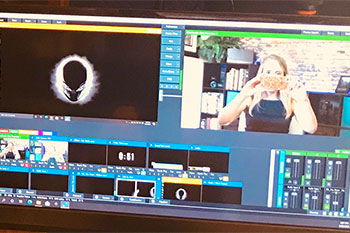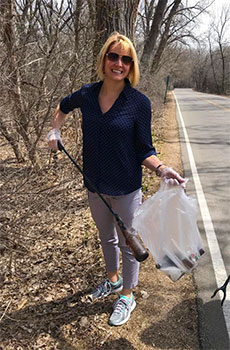
Julia Yates prepares for a “Meeting Takeover” to help DFMCH employees manage the stress of working remotely.
“Think about your feet.” It was an interesting request posed by FamWell Board Director Julia Yates, MSW, LCSW, as she led a meditation at the start of a recent Department of Family Medicine and Community Health (DFMCH) Alumni Hall Faculty/Staff Town Hall Meeting. A few minutes of guided meditation before meetings is just one tool the DFMCH has embraced to promote wellness among faculty and staff. The idea of employee wellness has gained momentum in recent years, and the DFMCH has been a leader at UW, forming the FamWell Board in 2017. The board’s mission is to foster a culture of self-care and collective practices that enhance health and wellness within the DFMCH to cultivate resilience, joy and appreciation for ourselves, our colleagues and those for whom we provide care.

Business Office Manager Julia Smith participated in a lunchtime walk to pick up litter near the DFMCH Alumni Hall location in 2018.
In partnership with the UW–Madison campus initiative UWell, FamWell grew to offer online wellness resources; lunchtime meditations led by Integrative Health Education and Research Coordinator Sara Arscott, PhD, MS; and even coaching on topics including conflict resolution and team building. “Wellness is one of my passions,” said Arscott, “and I started the weekly meditations to make sure we were focusing on staff wellness as well as that of clinicians.” FamWell also served as a springboard for committees devoted to social cohesion and connection including the DFMCH Climate Committee, the Building Beautification Committee, and the Breakfast Club—a social group that plans a variety of activities from lunchtime games of Catch Phrase to walks to pick up litter in the community. “Our department has been at the forefront,” said Yates. “Sanctioning time for this is a big paradigm shift.”
For the past 4 years, the DFMCH has collaborated with UW-Madison to offer an annual wellness symposium. This year, the in-person symposium was replaced with a month of virtual wellbeing sessions in October. The free sessions were available to all DFMCH employees and featured a range of topics including racial healing and transformation, reflection, mindfulness, environment, health and safety. Some offerings were self-paced while others were scheduled virtual events featuring guest speakers.
The Pandemic Brings Greater Need

Limited numbers of employees are able to work in Alumni Hall during the COVID-19 pandemic so they leave notes for each other expressing fun, hope and gratitude.
With a foundation in place, FamWell got creative to help alleviate the stress of moving to a remote work environment at the start of the COVID-19 pandemic. A team quickly formed to add remote wellbeing resources to the employee website, recurring monthly meditations were offered through WebEx, and supervisors started inviting Yates to their virtual staff meetings to do a “Meeting Takeover.” “The meeting takeovers are popular,” said Yates. “It really gives teams a chance to connect, share the challenges of working in isolation and acknowledge that it’s ok not to be ok.” During a meeting takeover, a member of the FamWell Board pops in at the request of a manager or supervisor and guides teams through meditation, games, or just encourages people to share their experiences.
Tom Hahn, MD, a physician at the UW Health Verona Clinic, added that the many new stressors and changes that have come with the COVID era make self-care and wellness even more important. “Despite all of the support for wellness in our healthcare systems and department, burnout continues to be a significant problem, especially during COVID, so reevaluating our approach to wellness is important, and we are lucky to have the FamWell Board to partner with UW Health and lead us in these efforts,” shared Hahn. He’s also experienced the benefits first hand. “It is nice to have someone outside the group come in and lead the wellness portion of the meeting so that everyone can be a participant, and it is also helpful to have wellness scheduled into the meeting to ensure that it is prioritized,” said Hahn. “Having a few minutes during a meeting to stop and think, be present in the moment, and just breathe can really have a positive impact on the rest of my day.”
Residency Program Director Ildi Martonffy, MD, agrees and notes the strong correlation between employee wellness and the impact it has on patient care and the broader community. “There is not a one size fits all approach to wellness but recognizing self-care as an integral part of what we do every day is important,” said Martonffy. “It’s important for residents to see us modeling the importance of wellness at all levels and show how it needs to be integrated into curriculum and everyday life.”
A Remote Work-iversary

The “greenhouse” formed to allow employees to take care of plants left behind when most staff moved to a remote work environment in March 2020. Taking care of a co-worker’s plants is one way employees at DFMCH are promoting wellness and staying connected.
As DFMCH employees approach the one-year anniversary of the move to a mostly remote work environment, it seems wellness is finding its place on the schedule. Research Coordinator Cassandra Sundaram, MS, helps organize many of the Breakfast Club events that have become a cornerstone in promoting social connection. “Even as many of us transition to new ‘normals’ throughout different stages of the pandemic, it feels important to continue to celebrate each other, our work, and our resiliency in a year filled with so much loss,” said Sundaram. “We’re so grateful to be able put these events together, with the hope that feelings of isolation in a socially distanced environment don’t become part of that new ‘normal’.”
More Work to Do
There are many dimensions to wellness and Associate Director of the Office of Community Health Shelly Shaw, MPH, believes, “We need to take a hard look at our systems and structures to ensure they are reinforcing our values and helping to create a workplace where everyone feels safe, included, and healthy.” It is Shaw’s hope that each effort ,whether it’s providing development opportunities or mental health resources for those struggling with personal or professional challenges, will move the department closer to the ultimate goal of a fully inclusive and joyful space where community and personal care are as important as patient care.
For more information about FamWell or other wellness resources, contact Julia Yates: julia.yates@fammed.wisc.edu
DFMCH FamWell Board
Sara Arscott, PhD, MS; James Bigham, MD, MPH; Caroline Swenson, MBA; Adrienne Hampton, MD; David Kiefer, MD; Ildi Martonffy, MD; Amy Mihm, MS, RD, LAT; Nicole Youngberg; Samantha Sharp, MD; Nicole Weathers, MD; Sarah Webber, MD; Julia Yates, MSW, LCSW; Lisa Simpson, PA-C; Nicole Vegel, MPH; Lauren Mixtacki, MD; April Schulz; Jashan Octain, MD
Published: March 2021
